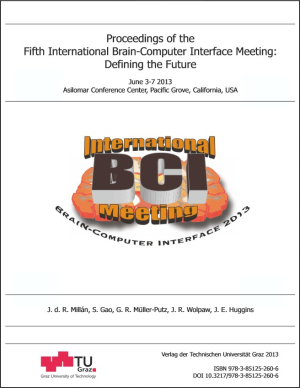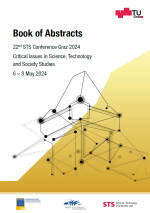Foreword
The International Brain-Computer Interface (BCI) Meeting Series occupies a unique place among conferences for BCI research by bringing together researchers and stakeholders from diverse disciplines. Neurologists, computer scientists, rehabilitation engineers, physicians, sensor engineers, psychologists, speech-language pathologists, ethicists, and actual BCI users are all active participants in the BCI Meeting Series. Further, the inclusive, retreat-like atmosphere of the BCI Meeting Series provides extensive opportunities for interaction and development of collaborations. The impact of the BCI Meetings Series is demonstrated by the high percentage of citations received by papers from attendees. Of the 499 articles published in 2011 and listed in Web of Science with a topic of “brain-computer interface”or “brain-machine interface,”28 (5.6%) were part of the special issue resulting from the last meeting. However, citations of the articles in the special issue represent 15.7% of the 776 citations ofthe BCI papers published in 2011.The Fifth International BCI Meeting represents the graduation of the BCI Meeting Series to joint organization by a Steering Committee of prominent BCI researchers from around the world. The diversity of BCI research represented in this planning process has resulted in a vibrant, exciting Meeting with increased involvement from the many sectors that make up BCI research. The papers in these Proceedings show the increasing focus on the future of BCI research and the importance of translational issues to make BCIs practical for people who need them. These papers describe: Technical and protocol innovations to enable successful BCI use by people with the most severe motor impairments. The importance, flexibility, and advantages of different types of input signals for BCI research. Innovative new applications for BCI use by people with and without impairments. The interpretation of signals associated with movement, grip, and recognition of errors. Appropriate evaluation of BCI performance to understand and improve BCI usefulness. Therapeutic effects of BCIs to not only accommodate for impaired function, but facilitate healing. Together, this BCI Meeting and its Proceedings represent the breadth of BCI research and help us to define the future of BCIs as successful, beneficial tools.On behalf of the BCI Meeting Steering Committee, I thank you for your interest in the BCI Meeting and hope to see you at this and future installments in the BCI Meeting Series.
Issue: Open Access E-Book
ISBN: 978-3-85125-260-6
Language: Englisch
Release date: June 2013
Foreword
The International Brain-Computer Interface (BCI) Meeting Series occupies a unique place among conferences for BCI research by bringing together researchers and stakeholders from diverse disciplines. Neurologists, computer scientists, rehabilitation engineers, physicians, sensor engineers, psychologists, speech-language pathologists, ethicists, and actual BCI users are all active participants in the BCI Meeting Series. Further, the inclusive, retreat-like atmosphere of the BCI Meeting Series provides extensive opportunities for interaction and development of collaborations. The impact of the BCI Meetings Series is demonstrated by the high percentage of citations received by papers from attendees. Of the 499 articles published in 2011 and listed in Web of Science with a topic of “brain-computer interface”or “brain-machine interface,”28 (5.6%) were part of the special issue resulting from the last meeting. However, citations of the articles in the special issue represent 15.7% of the 776 citations ofthe BCI papers published in 2011.The Fifth International BCI Meeting represents the graduation of the BCI Meeting Series to joint organization by a Steering Committee of prominent BCI researchers from around the world. The diversity of BCI research represented in this planning process has resulted in a vibrant, exciting Meeting with increased involvement from the many sectors that make up BCI research. The papers in these Proceedings show the increasing focus on the future of BCI research and the importance of translational issues to make BCIs practical for people who need them. These papers describe: Technical and protocol innovations to enable successful BCI use by people with the most severe motor impairments. The importance, flexibility, and advantages of different types of input signals for BCI research. Innovative new applications for BCI use by people with and without impairments. The interpretation of signals associated with movement, grip, and recognition of errors. Appropriate evaluation of BCI performance to understand and improve BCI usefulness. Therapeutic effects of BCIs to not only accommodate for impaired function, but facilitate healing. Together, this BCI Meeting and its Proceedings represent the breadth of BCI research and help us to define the future of BCIs as successful, beneficial tools.On behalf of the BCI Meeting Steering Committee, I thank you for your interest in the BCI Meeting and hope to see you at this and future installments in the BCI Meeting Series.
These could also be of interest to you
- Catalog
- New releases
-
Open Access publications

- Enhanced e-books
-
Series
- Akademische Reden an der Technischen Universität Graz
- Arbeitshilfen für die Praxis
- Archiv und Bibliothek
- Betonkolloquium
- Buddhist Architecture in the Western Himalayas
- BWL Schriftenreihe
- Electrical Power Systems
- Fachbücher Planung und Bau
- Facts & Figures
- Festschriften TU Graz
- Forschungsreihe IBBW
- Forum Technik und Gesellschaft
- Geodesy
- Immersive Learning Research Network Conference; Workshop, short papers, poster
- Institut für Gebäudelehre Jahrbuch
- International Brain-Computer Interface (BCI) Meeting
- LM.VM.2014
- Logistik Werkstatt Graz
- Materialien zu Schwerpunkten am Institut für Gebäudelehre
- Mathematical Modelling of Weld Phenomena
- Monographic Series TU Graz
- Monographic Series TU Graz|Advanced Materials Science
- Monographic Series TU Graz|Computation in Engineering and Science
- Monographic Series TU Graz|Production Science and Management
- Monographic Series TU Graz|Railway Research
- Monographic Series TU Graz|Reihe Fahrzeugtechnik
- Monographic Series TU Graz|Schriftenreihe des Instituts Betonbau
- Monographic Series TU Graz|Structural Analysis
- Monographic Series TU Graz|Techno- und sozioökonomisch orientierte Betriebswirtschaft
- Monographic Series TU Graz|Technoökonomie und industrielles Management
- Monographic Series TU Graz|Timber Engineering & Technology
- November Talks
- Proceedings of the International Brain-Computer Interface
- Schriftenreihe des Instituts für Baubetrieb und Bauwirtschaft
- Schriftenreihe des Instituts für Straßen- und Verkehrswesen
- Schriftenreihe des Instituts für Wohnbau der TU Graz
- Schriftenreihe zur Wasserwirtschaft
- Science, Technology and Society online
- Seminarreihe Bauunternehmensführung
- Studien zur Architektur | TU Graz
- Textbook Series
- Transform Industry: Guiding the transformation of SMEs
- TU Graz Jahresbericht | Annual report
- TU Graz people
- TU Graz Research
- VKM-THD Mitteilungen; IVT-Mitteilungen ab Bd. 100
- Authors
- Sale
Contact
Verlag der
Technischen Universität Graz
Technikerstraße 4
8010 Graz, Österreich
UID(VAT) ATU 57477929
contact person
Gabriele Groß
Tel.: +43(0)316 873 6157
E-Mail: verlag [ at ] tugraz.at
Privacy Overview
Necessary cookies are absolutely essential for the website to function properly. These cookies ensure basic functionalities and security features of the website, anonymously.
| Cookie | Dauer | Beschreibung |
|---|---|---|
| cookielawinfo-checkbox-analytics | 11 months | This cookie is set by GDPR Cookie Consent plugin. The cookie is used to store the user consent for the cookies in the category "Analytics". |
| cookielawinfo-checkbox-functional | 11 months | The cookie is set by GDPR cookie consent to record the user consent for the cookies in the category "Functional". |
| cookielawinfo-checkbox-necessary | 11 months | This cookie is set by GDPR Cookie Consent plugin. The cookies is used to store the user consent for the cookies in the category "Necessary". |
| qtrans_front_language | 1 year | This cookie is set by qTranslate WordPress plugin. The cookie is used to manage the preferred language of the visitor. |
| viewed_cookie_policy | 11 months | The cookie is set by the GDPR Cookie Consent plugin and is used to store whether or not user has consented to the use of cookies. It does not store any personal data. |
| woocommerce_cart_hash | session | This cookie is set by WooCommerce. The cookie helps WooCommerce determine when cart contents/data changes. |
Analytical cookies are used to understand how visitors interact with the website. These cookies help provide information on metrics the number of visitors, bounce rate, traffic source, etc.
| Cookie | Dauer | Beschreibung |
|---|---|---|
| _pk_id | 1 year 27 days | Required for the operation of Matomo, an analysis tool that tracks and analyzes user behavior. |
| _pk_ref | 13 months | Required for the operation of Matomo, an analysis tool that tracks and analyzes user behavior. |
| _pk_ses | 30 minutes | Required for the operation of Matomo, an analysis tool that tracks and analyzes user behavior. |
Other uncategorized cookies are those that are being analyzed and have not been classified into a category as yet.
| Cookie | Dauer | Beschreibung |
|---|---|---|
| yt-remote-connected-devices | never | No description available. |
| yt-remote-device-id | never | No description available. |







